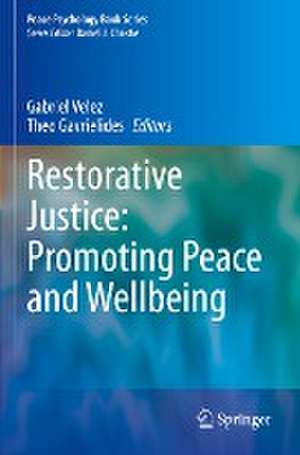Restorative Justice: Promoting Peace and Wellbeing: Peace Psychology Book Series
Editat de Gabriel Velez, Theo Gavrielidesen Limba Engleză Paperback – 28 sep 2023
| Toate formatele și edițiile | Preț | Express |
|---|---|---|
| Paperback (1) | 638.57 lei 6-8 săpt. | |
| Springer International Publishing – 28 sep 2023 | 638.57 lei 6-8 săpt. | |
| Hardback (1) | 644.82 lei 6-8 săpt. | |
| Springer International Publishing – 27 sep 2022 | 644.82 lei 6-8 săpt. |
Din seria Peace Psychology Book Series
- 18%
 Preț: 779.26 lei
Preț: 779.26 lei -
 Preț: 361.07 lei
Preț: 361.07 lei - 15%
 Preț: 639.25 lei
Preț: 639.25 lei - 18%
 Preț: 788.54 lei
Preț: 788.54 lei - 15%
 Preț: 699.28 lei
Preț: 699.28 lei - 15%
 Preț: 646.62 lei
Preț: 646.62 lei - 18%
 Preț: 1690.13 lei
Preț: 1690.13 lei - 15%
 Preț: 645.28 lei
Preț: 645.28 lei - 24%
 Preț: 1044.87 lei
Preț: 1044.87 lei - 18%
 Preț: 945.14 lei
Preț: 945.14 lei - 15%
 Preț: 649.54 lei
Preț: 649.54 lei -
 Preț: 386.39 lei
Preț: 386.39 lei - 15%
 Preț: 697.82 lei
Preț: 697.82 lei - 15%
 Preț: 591.14 lei
Preț: 591.14 lei - 18%
 Preț: 1222.94 lei
Preț: 1222.94 lei - 15%
 Preț: 644.82 lei
Preț: 644.82 lei - 15%
 Preț: 649.22 lei
Preț: 649.22 lei - 15%
 Preț: 697.65 lei
Preț: 697.65 lei -
 Preț: 388.72 lei
Preț: 388.72 lei - 15%
 Preț: 647.08 lei
Preț: 647.08 lei - 24%
 Preț: 967.03 lei
Preț: 967.03 lei - 15%
 Preț: 638.89 lei
Preț: 638.89 lei - 15%
 Preț: 650.37 lei
Preț: 650.37 lei - 18%
 Preț: 733.15 lei
Preț: 733.15 lei -
 Preț: 398.74 lei
Preț: 398.74 lei - 15%
 Preț: 644.30 lei
Preț: 644.30 lei - 18%
 Preț: 1116.57 lei
Preț: 1116.57 lei -
 Preț: 365.05 lei
Preț: 365.05 lei - 15%
 Preț: 643.99 lei
Preț: 643.99 lei - 18%
 Preț: 1116.26 lei
Preț: 1116.26 lei - 18%
 Preț: 1381.26 lei
Preț: 1381.26 lei - 18%
 Preț: 1595.75 lei
Preț: 1595.75 lei - 18%
 Preț: 779.89 lei
Preț: 779.89 lei
Preț: 638.57 lei
Preț vechi: 751.25 lei
-15% Nou
Puncte Express: 958
Preț estimativ în valută:
122.20€ • 132.70$ • 102.65£
122.20€ • 132.70$ • 102.65£
Carte tipărită la comandă
Livrare economică 22 aprilie-06 mai
Preluare comenzi: 021 569.72.76
Specificații
ISBN-13: 9783031131035
ISBN-10: 3031131037
Pagini: 224
Ilustrații: XXXI, 224 p. 10 illus., 9 illus. in color.
Dimensiuni: 155 x 235 mm
Greutate: 0.37 kg
Ediția:1st ed. 2022
Editura: Springer International Publishing
Colecția Springer
Seria Peace Psychology Book Series
Locul publicării:Cham, Switzerland
ISBN-10: 3031131037
Pagini: 224
Ilustrații: XXXI, 224 p. 10 illus., 9 illus. in color.
Dimensiuni: 155 x 235 mm
Greutate: 0.37 kg
Ediția:1st ed. 2022
Editura: Springer International Publishing
Colecția Springer
Seria Peace Psychology Book Series
Locul publicării:Cham, Switzerland
Cuprins
Section 1: Intrapersonal Peace.- Chapter 1: Developing Peaceful Self-Identities Through Restorative Practices.- Chapter 2: Restorative Practices as Peace Pedagogy.- Chapter 3: Promoting Coping and Resilience Through Reparation.- Section 2: Interpersonal, Intergroup, and Intercommunity Peace.- Chapter 4: Bridging the Unbridgeable Divides.- Chapter 5: Preventing and Healing Community Violence.- Chapter 6: Addressing Systemic Injustice and Oppression.- Chapter 7: Peace and Harmony in Post-Conflict Societies.- Chapter 8: Restoring from Non-Western Lenses.- Chapter 9: Bridging Racial/Ethnic Divides.- Section 3: Institutional, International and Non-state Actors.- Chapter 9: Changing School Cultures.- Chapter 10: Reshaping Discipline: Ending Inequities of Retributive Measures in Schools.- Chapter 11: Forgiving and Repairing: Restorative Justice and the Criminal Justice System.- Chapter 12: Former Combatants and Reintegration.- Chapter 13: Reparations and Addressing State Atrocities.
Notă biografică
Gabriel Mateo Velez, PhD, Educational Policy and Leadership, College of Education, Marquette University
Professor Theo Gavrielides, PhD, is a legal philosopher and a world-known restorative justice expert. He is the Founder and Director of the Restorative Justice for All (RJ4All) International Institute, and holds various visiting positions as a professor, fellow and scholar in many universities across the world.
Professor Theo Gavrielides, PhD, is a legal philosopher and a world-known restorative justice expert. He is the Founder and Director of the Restorative Justice for All (RJ4All) International Institute, and holds various visiting positions as a professor, fellow and scholar in many universities across the world.
Textul de pe ultima copertă
This timely collection of chapters written by international experts bridges the gap between peace psychology and restorative justice. The Editors combined their respective fields of expertise to start a much-needed debate on the potential but also risks that are associated when implementing restorative justice in the peace psychology field. The volume highlights how psychological theory and research can inform and evaluate the potential of restorative practices in formal and informal educational settings as well as the criminal justice space. The chapters cover both negative and positive peace across levels while introducing the reader to various case studies from across the world. All in all, the book explores how restorative justice can promote positive peace through its connection fostering dialogue, empathy, forgiveness, and other key psychological elements of peace.
Caracteristici
Illuminates the connection between peace psychology and restorative justices Demonstrates the importance of psychological theory in restorative practices Emphasizes the elements of dialogue and the role of restorative justice values for achieving peace
